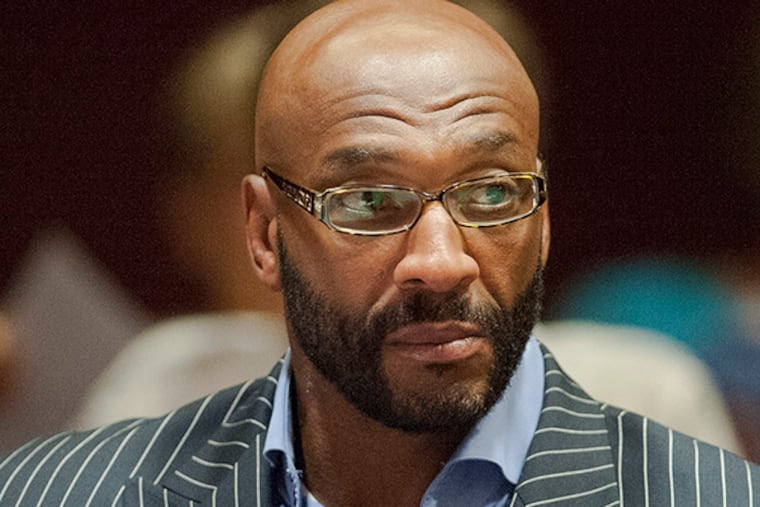Fryar, mother decline to take stand
The lawyers defending former Eagles player Irving Fryar and his mother, Allene McGhee, against mortgage fraud charges rested their case in a Mount Holly courtroom Tuesday without calling any witnesses.

The lawyers defending former Eagles player Irving Fryar and his mother, Allene McGhee, against mortgage fraud charges rested their case in a Mount Holly courtroom Tuesday without calling any witnesses.
Fryar, 52, of Springfield Township, Burlington County, and McGhee, 74, a retired school bus driver from Willingboro, both decided against taking the stand to testify after the prosecution completed its case and the jury trial entered its third week. The two are charged with conspiracy and theft by deception in connection with a $1.2 million mortgage scheme involving six banks and one lending company in South Jersey and Philadelphia between October and December 2009.
Mark Fury, McGhee's attorney, said the state Attorney General's Office had failed to prove its case and that McGhee did not need to testify to her innocence. Michael Gilberti, who represents Fryar, said he, too, saw no point in calling his client to the stand.
Closing statements were scheduled for Wednesday morning in the courtroom of Superior Court Judge Jeanne T. Covert, who is presiding over the trial.
A dozen supporters of Fryar and McGhee have attended most days as the state methodically laid out the mechanics of a complex scheme in which the two allegedly conspired with a mortgage broker to obtain home equity lines of credit from six banks in quick succession.
The state contends the two used McGhee's former Willingboro home, valued at $200,000, as collateral for each loan, without disclosing they had applied for other loans. Fryar and McGhee are also accused of falsely claiming on the applications that McGhee earned more than $72,000 as an event coordinator at the church Fryar founded when he retired as an NFL wide receiver and Pro Bowl athlete in 2001 after a 17-year career that included playing for the New England Patriots. He is a minister at the church, New Jerusalem House of God in Mount Holly.
The state alleges Fryar got $200,000 in the scheme and McGhee got a mortgage for her house. The two also are accused of conspiring to fraudulently obtain more than $400,000 from a lending institution to refinance Fryar's Springfield house.
But the defense argued that Fryar and McGhee were deceived by William Barksdale, a former Levittown mortgage broker who has pleaded guilty to conspiring to defraud 10 or more banks of a total of more than $2 million with five clients.
Barksdale, 48, is serving 20 years in federal prison and was a key prosecution witness at Fryar and McGhee's trial.
The defense lawyers contend that Fryar and McGhee needed help in refinancing their homes and turned to Barksdale for help. Their clients did not know Barksdale would use them and pocket the loans while obtaining mortgages for them, the lawyers said.
On Tuesday, state Division of Criminal Justice Detective Kimberly Allen was the last witness to testify. In response to questions from Deputy Attorney General John Nicodemo, she said that her examination of the bank records showed that Barksdale's company had been given most of the loan money. She said Barksdale then wrote checks to Fryar or provided cashier's checks that were later placed into Fryar's bank account. Some of the loan money was also transferred to McGhee's account, she said.
Under cross-examination, Fury, McGhee's lawyer, asked Allen to add up the loans the six banks had approved and to calculate how much went into Barksdale's account, and to put the numbers on a poster board for the jury to see. She then said a total of $854,300 had been provided by the banks and that $797,000 had been deposited into Barksdale's account to pay off the mortgage that he held on McGhee's house.
Barksdale had represented to each of the six banks that he held the mortgage on McGhee's house and that she would use the loans she obtained to pay it off.
Fury asked Allen if she knew that McGhee had made mortgage payments on her house to one of the banks and was surprised two years later to lose her house when a second bank foreclosed upon it.
Fury said Barksdale had told McGhee that the other five loans that she had applied for had not been approved.
Allen said she knew of the foreclosure but didn't recall that McGhee had made the payments.